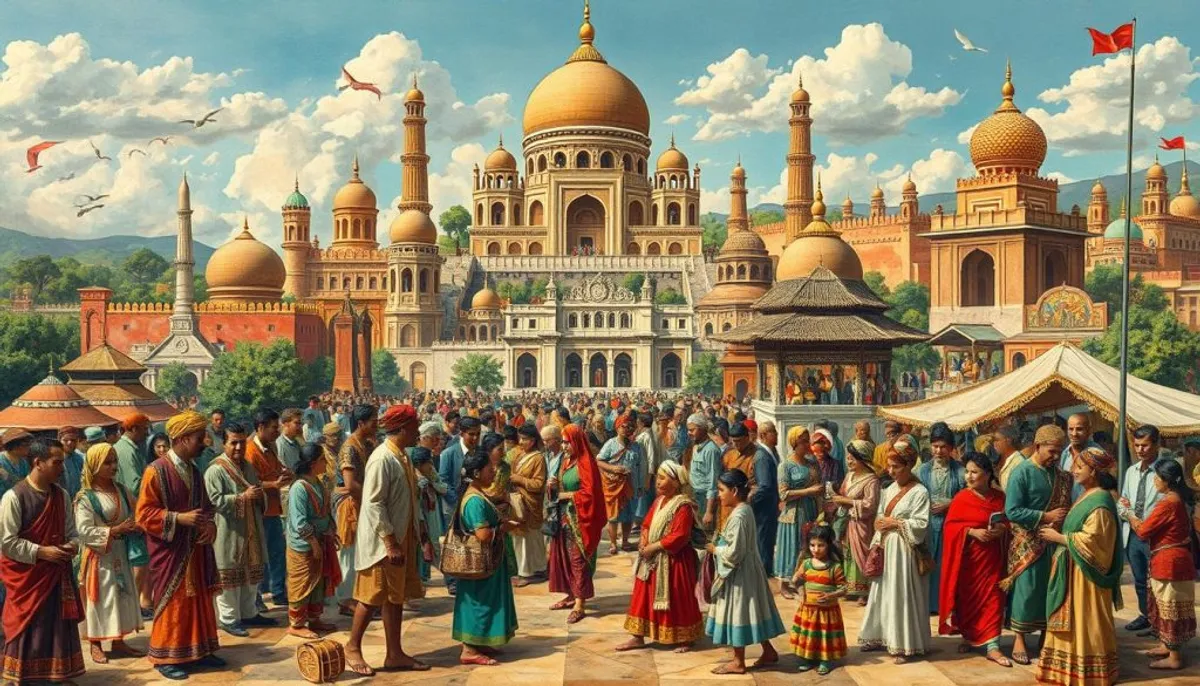Culture shapes our identity from the moment we are born. It envelops us, guides us, and defines us. In fact, 100% of individuals are socialized in a specific cultural context from their earliest days. This process is so powerful that 90% of young people assimilate the sociocultural norms of their surroundings before they turn 10.
The fundamental question of cultural anthropology invites us to explore the roots of our being. Culture, this set of principles that governs a civilization, includes language as an essential vector. It brings people together and transmits values that forge our identity.

A survey reveals that 70% of people believe that culture contributes to the formation of their personal and social identity. This figure highlights the crucial importance of understanding how different societies develop their own systems of values, beliefs, and behaviors.
In this journey through the meanders of human identity, we will discover how language and socialization play a key role. We will also explore how the transmission of cultural values shapes our worldview and our interactions with others.
Does culture make man: foundations of human identity
Culture is essential to the formation of our identity. It influences our perception of the world, our values, and our behaviors. Cultural diversity enriches our society, offering a multitude of perspectives and traditions.
The role of language in identity construction
Language is a pillar of our identity. It allows us to communicate, think, and express our culture. Linguistic studies from the 20th century have revealed that language profoundly shapes our individual thought. This challenges the idea of isolated individuality.
The influence of socialization on identity
Socialization, through education and social interactions, shapes our identity. The principles of socialization vary according to cultural contexts. In a traditional community, the emphasis is on common practices. In contrast, in a Western society, individualization is prioritized.
The transmission of cultural values
The transmission of cultural values is crucial for the preservation of cultural heritage. It occurs across generations. It includes integration into a linguistic community, the individual-collective link, the use of common traditions, and the sharing of moral values.
| Dimension | Description |
|---|---|
| Linguistic community | Sharing a common language |
| Individual-collective link | Recognition of social belonging |
| Common traditions | Shared cultural practices |
| Moral values | Ethical principles guiding behavior |
Culture shapes human identity through language, socialization, and the transmission of values. This complex interaction between the individual and their culture enriches our cultural heritage. It also contributes to the diversity of our societies.
Nature and culture: a complex relationship
The relationship between nature and culture is fundamental to our identity. This duality influences our perception of the world and our development. Cultural relativism encourages us to explore this complexity with an open mind. It invites us to recognize the diversity of cultures.
The case of wild children
The story of wild children, such as Victor of Aveyron, highlights the importance of the cultural environment. These children show that biological belonging to the human species is not enough. Acculturation, the process of integrating the norms and values of our society, is crucial for our identity.
The prohibition of incest: a universal cultural marker
The prohibition of incest is a universal example of a cultural rule. It is present in all societies, transcending geographical and temporal boundaries. This cultural constancy shows the existence of common principles, despite the diversity of cultures.
The inseparability of nature and culture in humans
Human beings are deeply rooted in both culture and nature. This duality makes it impossible to separate our natural and cultural aspects. Cultural relativism helps us understand this complexity. It allows us to see the diversity of cultures while recognizing our common biological foundation. This perspective enriches our understanding of human identity.
Cultural anthropology and the formation of identity
Cultural anthropology is essential for understanding how identity is formed. It examines how societies create their unique values and behaviors. In 1952, Alfred Kroeber and Clyde Kluckhohn listed over 150 definitions of culture, demonstrating its complexity.
Exploring cultural differences helps us avoid ethnocentrism. This tendency to judge other cultures by our own is common. Anthropology encourages us to adopt a broader perspective, recognizing the diversity of global practices and beliefs.
The culture shock, often encountered when meeting other cultures, profoundly influences our identity. This experience, sometimes unsettling, prompts us to question our own values. For example, the site of Gobustan in Azerbaijan, with its millennia-old petroglyphs, invites us to reflect on our heritage.
Cultural anthropology reveals that identity is dynamic. It evolves in contact with different cultures, a phenomenon evident in our globalized world. This discipline guides us through the complexity of cultural interactions, fostering better mutual understanding and enriching our identity.
Cultural relativism versus ethnocentrism
The debate between cultural relativism and ethnocentrism raises crucial questions about our perception of different cultures. Ethnocentrism, a concept introduced by William G. Sumner in the early 20th century, reflects the tendency to judge other cultures through the lens of one's own. This approach can lead to prejudice and a profound misunderstanding of other cultures.
The dangers of ethnocentrism
Ethnocentrism can lead to dangerous prejudices. Claude Lévi-Strauss emphasizes that it is the driving force that can lead to racism. This attitude has sometimes justified inhumane practices such as slavery, which was officially abolished in Niger only in 1999. The consequences of ethnocentrism are profoundly harmful, leading to injustices and violence.
Cultural diversity as wealth
Cultural relativism, promoted by UNESCO since 1945, values cultural diversity. Lévi-Strauss, in “Race and History” (1961), asserts that all cultures are equivalent and serve a protective function for humanity. This perspective emphasizes the importance of cultural diversity and the richness it brings to our humanity.

The limits of cultural relativism
Radical relativism poses problems by denying the existence of universal values. It can lead to an identity confinement, ignoring harmful cultural stereotypes. The Universal Declaration of Human Rights attempts to reconcile respect for diversity with common values. This declaration illustrates the importance of finding a balance between respecting diversity and recognizing universal values.
| Perspective | Advantages | Disadvantages |
|---|---|---|
| Ethnocentrism | Reinforces cultural identity | Can lead to racism and discrimination |
| Cultural relativism | Promotes openness and understanding | Risk of justifying controversial practices |
| Interculturality | Encourages dialogue and exchange | Complex to implement |
Acculturation and the clash of cultures
Cultural anthropology explores how culture shapes the individual. Acculturation, essential in this process, involves the adoption of foreign cultural practices. This profoundly transforms our personal identity.
The mechanisms of acculturation
Acculturation manifests through education and exposure to media. A study reveals that 24.2% of Abidjan residents preferred foreign radio stations to local media in 1995. This shows the influence of external cultures on our perception.
The impact on individual identity
The culture shock, a key aspect of acculturation, affects individuals differently. Children, being more open, acculturate faster than adults. This phenomenon can create identity tensions, especially among young people confronted with two cultures.
Cultural adaptation strategies
In the face of acculturation, people choose various strategies. Some fully identify with the new culture, while others seek a balance. John Schumann's theory indicates that immersion accelerates acculturation, particularly in learning a foreign language.
| Strategy | Description | Impact |
|---|---|---|
| Integration | Balance between home and host cultures | Positive adaptation, cultural enrichment |
| Assimilation | Complete adoption of the new culture | Potential loss of original identity |
| Separation | Exclusive maintenance of the original culture | Possible social isolation |
Acculturation shapes our identity, raising the question: does culture make man? This complex phenomenon demonstrates the profound influence of cultures on our personal and collective development.
Cultural heritage as a vector of identity
Cultural heritage is fundamental in the formation of our identity. It includes traditions, arts, and practices passed down from generation to generation. In France, this rich heritage attracts millions of visitors annually, enriching the economy and cultural diversity of the country.
In 2022, France welcomed 75 million international tourists, captivated by its unique cultural heritage. This impressive figure illustrates the universal appeal of French culture. Cultural tourism, representing about 40% of international tourism, underscores the importance of heritage in the global economy.

- Material heritage: archaeological sites, architecture, art objects
- The intangible heritage: songs, customs, dances, myths
The preservation of this heritage is crucial for maintaining cultural diversity. It requires strategies tailored to each type of heritage. The state, since the French Revolution, plays an essential role in this conservation.
| Type of satisfaction | Description |
|---|---|
| Individual | Aesthetic or artistic pleasure |
| Collective | Embodiment of history and the image of a territory |
| Social | Feeling of belonging and social cohesion |
Cultural heritage stimulates creativity in the face of globalization. It offers specific social and cultural references, acting as a powerful vector of identity. By preserving our heritage, we ensure the transmission of our history and values to future generations.
Interculturality in the modern world
In our era of globalization, interculturality is essential. The World Conference on Cultural Policies in 1982 in Mexico brought together 130 governments. It established 54 guiding principles for global cultural policies. This initiative highlights the growing importance of intercultural understanding.
The challenges of cultural globalization
Globalization accelerates cultural exchanges, creating tension between homogenization and the preservation of local identities. Translation and interpretation professionals for migrants face unique challenges. These challenges influence public services, such as health and education.
The preservation of cultural identities
Preserving cultural identities while opening up to intercultural exchanges represents a major challenge. Interculturality invites us to rethink our self-awareness and ethical commitment. It values cultural diversity.
Intercultural dialogue
Intercultural dialogue is essential for promoting mutual understanding and combating cultural stereotypes. It has become common vocabulary in various fields, from education to marketing. This reflects its growing importance.
| Field | Impact of interculturality |
|---|---|
| Education | International exchange programs |
| Communication | Adaptation of marketing strategies |
| Public services | Intercultural training for professionals |
Interculturality pushes us to reevaluate our identity in an interconnected world. It invites us to embrace diversity while preserving our cultural roots. This creates a delicate yet enriching balance in our globalized society.
Conclusion
Culture profoundly shapes our identity, influencing our perception of the world and our social interactions. It is the prism through which we interpret reality, thus forming the foundation of our being. This influence is deep and omnipresent, shaping our way of seeing the world, and sometimes, it can provoke a clash of cultures.
Cultural relativism invites us to recognize the diversity of practices and beliefs, avoiding hasty judgments. It teaches us to appreciate the variety of human experiences without judging them. However, it is crucial not to fall into absolute moral relativism. Acculturation, an inevitable phenomenon in our globalized world, poses challenges but also offers opportunities for mutual enrichment.
Ultimately, understanding the role of culture in the formation of human identity allows us to better know ourselves and appreciate the richness of cultural diversity. It is by cultivating this understanding that we can build bridges between different cultures while preserving our unique identities. This understanding is essential for harmonious and enriching coexistence.
RelatedRelated articles


